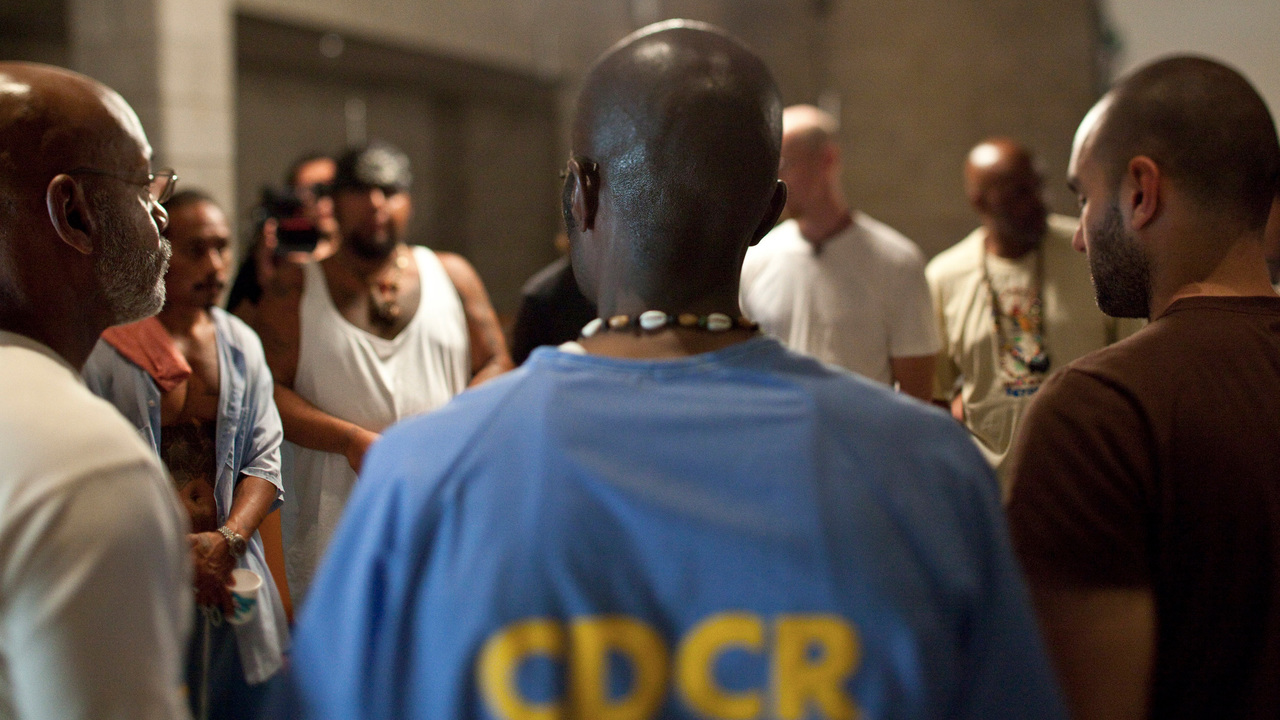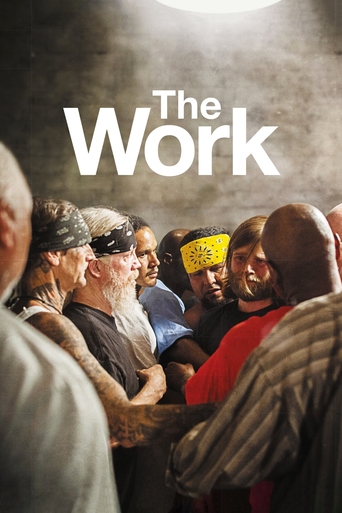Develiker
terrible... so disappointed.
Mehdi Hoffman
There's a more than satisfactory amount of boom-boom in the movie's trim running time.
Sienna-Rose Mclaughlin
The movie really just wants to entertain people.
Zandra
The movie turns out to be a little better than the average. Starting from a romantic formula often seen in the cinema, it ends in the most predictable (and somewhat bland) way.
FilmsFillMyHoles
The Work shows a group therapy program set in Folsom Prison, where a set of convicts, with brutal histories and broken lives, sit down with a few volunteers from the outside world and share their pain with each other in the most civilized manner possible. The film does not sugarcoat anything, showing everything as it is, with honesty, but never exploiting or lessening the integrity of its subjects. The life stories and decisions the prisoners made in the past are gruesome and dark, but the program and documentary makes an effort to refrain from judging them by their actions alone, demonstrating that they are not that different from anybody else, they are human beings. There's the same amount of respect and emphasis on the volunteer's demons and struggles, which further reinforces the previous statement. The Work makes the wise choice of singling out a few characters, people and concentrate mainly on them and their baggage. Though I would have loved to hear everybody's story, this decision makes for a tighter and much more focused "narrative" and a more accessible documentary.Throughout the film we meet some extraordinary men, get to explore their psyche and empathize with their life story. The Work is an intense, brutally raw and tearjerking look at manhood, humanity and the depressing reality of a life lived behind bars. It shines a light to this incredible therapy program and makes the viewer reflect on their own lives. One of the best and most affecting documentaries I've ever seen.
Turfseer
Directed by Jairus McLeary and Gerthin Aldous, The Work takes us inside California's maximum security Folsom prison to observe a four day extremely intense group therapy session consisting of both inmates and civilians brought in to participate from the ordinary (non-criminal) world.The documentary begins with these ordinary Joes on the bus driving to the facility and expressing their anxiety about going inside a maximum security prison and having to interact with hardened criminals. Once they enter the room where the therapy sessions take place, they're each quickly paired off with an inmate partner whom they're encouraged to get to know before the actual therapy begins.The therapy itself often involves each man sharing accounts of a difficult relationship or traumatic event that leads to the blocking off of emotional feelings. In some cases the inmates become agitated and are held down by members of the group until they break down in tears. Other times, the mere recounting of a traumatic event leads to an emotional response-usually crying or in some cases, deeper sobbing. In one telling moment, one of the non-inmate participants honestly tells one of the inmates that he is unable to connect with his tale of being abandoned by a rejecting father. The inmate interprets this confession of emotional detachment as a belittlement of his particular situation and lashes out at the man calling him a "bitch" and almost ready to physically attack him.Many of these cathartic moments are difficult to watch as the average viewer may not be used to outpourings of such raw emotion. At the conclusion of The Work, we're informed that every inmate who went through the therapy sessions and was later released from prison, has not returned. That certainly is impressive!Nonetheless, one wonders if the therapy over such a short time period is effective in resolving past traumatic events. One clue that leads to skepticism is the nature of the emoting depicted. In every case, the crying (or sobbing) often seems blocked-as if the men are unable to break through into a deeper level of emotional release. This is understandable given taboos in our society for men to express their feelings. Instead of simply employing a confessional model to evoke emotions, there are other techniques involving physical exercises that can facilitate even deeper release from what the famed psychiatrist Wilhelm Reich referred to as "body armoring." An updated version of Reichian therapy, Bioenergetics, developed by Dr. Alexander Lowen, certainly could be put to good use in therapeutic settings such as this.The bottom line is any technique to uncover repressed emotions, including group therapy sessions with hardened criminals, should be viewed as something positive. Given reports of zero recidivism, this is a program that apparently "works."
Gil Holderbach
This film would not succeed without brilliant characters, brilliant moments and brilliant editing, and this film has all three, to the point that it's astonishing that this film isn't a work of complete fiction. There are so many intimate, raw, emotional breakthroughs, to the point that this film could have used some clearly defined moments of pure levity to avoid dulling them as the film goes on. This film's structure is incredibly well organized, with every character getting the spotlight in a way that seems bizarrely coordinated. There is so much character to all the characters, and they are all memorable. The filmmaker's ability to articulate the shared struggle made me cry, and as of writing this, this is the only film that has made me cry purely because of the quality of the filmmaking. It's especially impressive that not only that the three members of the public that are focused on have their moments of emotional enlightenment, but that their emotional struggles also seem thematically linked, and this thematic link is even acknowledged through a line of dialogue by one of the inmates. I sometimes forgot that I was watching a documentary because of how smooth the journey was, but even the elements of the film which remind me that this wasn't filmed in a controlled environment only enhanced their scenes. If this film turned out to be completely fabricated, I would not be surprised, nor would it devalue the film for me whatsoever.
JustCuriosity
The Work was extremely well-received during its world premiere at Austin SXSW Film Festival where it won the Grand Jury Prize in Documentary Feature Competition. This is one of the most intense films that you will ever see and it literally takes your breath away. It is follows several prisoners – many serving long sentences for violent, often gang-related, crimes - in a group therapy program at Folsom Prison over a four-day period in which they push each other to confront their demons. They discuss their betrayals which often involve deep-seated and painful issues in their family lives. They confront each physically and emotionally. They open up the darkest corners of their lives so that outside observers can understand that much of the anger that made them criminals comes from deep well-springs of personal suffering and often abuse. Indirectly, this film asks a very deep question about our criminal justice system: Is it supposed to warehouse and punish offenders or is it supposed to rehabilitate them to return to society? If it is the former it is doing so at a very great cost. If it is the latter than we need to invest in programs like this so that we can return these men to as productive members of society. This film shows us what rehabilitation looks like and subtly makes that argument. We need a national conversation about how the criminal justice system is failing and about how we can begin to repair it. We have begun discussing some aspects of this complex problem including reconsidering the "War on Drugs," but we also need to be discussing how to rehabilitate those currently imprisoned as well. I hope that it gains distribution so that a wider audience can see this powerful and compelling film and begin this conversation about the criminal justice system.

